#carl conrad coreander
Explore tagged Tumblr posts
Text
The Neverending Story, Introduction
(Curious what I'm doing here? Read this post! For the link index and a primer on The Neverending Story, read this one! Like what you see? Send me a Ko-Fi.)
In which we set our scene.
A picture of a sign on a shop's front door which reads "Carl Conrad Coreander / Old Books". It's a rainy November morning,(1) when the door opens violently, tinkling the bells above it.(2) A fat little boy(3) of perhaps age ten or twelve is soaked through from the rain. When he notices that he's in a bookshop, he seems to become overwhelmed.
A puff of smoke rises and then dissipates from further in, and the narration draws attention to the resemblance to smoke signals.(4) A voice tells the boy to close the door, whether he's staying or going, and the boy does so, then peeks around the bookcase hiding the speaker. He ends up being a "short, stout man" in a leather wingback chair.(5)
The man, seeing the child, says he cannot abide children, they're good for nothing to him.(6) The child says not all children are like that, and the man raises his eyebrows and asks if he's the great exception. The child shrugs and make to leave, but the man says he's rather impolite, not introducing himself. They exchange names: the boy is Bastian Balthazar Bux, and the old man is Carl Conrad Coreander.(7)
Mr Coreander asks why young Mr Bux came into the shop in such a hurry. Bastian says he was running away from some other children who were bullying him. Bastian's incapable of doing anything to make them stop,(8) he's not physically or mentally very strong. When Bastian says one of the names the children call him, at Mr Coreander's prompting, Corander asks why they use that word, and Bastian says he makes up stories and names for things and says them aloud to himself sometimes. Mr Coreander looks thoughtful and asks what Bastian's parents think. His father doesn't say anything, and his mother is dead.
Just then, the phone rings, and Mr Coreander reluctantly goes to answer it. It's a very long conversation, and at one point Bastian's name is said.
Bastian just looks at the book Mr Coreander had been holding, which holds a sort of magnetism for him. He walks over, and touches the cover, and it's as if something clicks inside him.
Bastian had a vague feeling that touching the book had started something irrevocable, which would now take its course.
Bastian picks up the book and examines it. It's titled
The Neverending Story
Human passions have mysterious ways, in children as well as grown-ups. Those affected by them can't explain them, and those who haven't known them have no understanding of them at all. [...] In short, there are as many different passions as there are people. Bastian Balthazar Bux's passion was books.(9)
If you've never loved books as Bastian did, you may not understand what he does next. This book feels like everything he's ever dreamed of, he must have it, at whatever price. But, knowing that he has no money to pay Mr Coreander for it, Bastian… steals it. Tucks it into his coat, opens the door only just enough to slip through so the bell doesn't ring.
Outside, he starts running, getting soaked in the rain as his conscience flares to life and starts telling him off for stealing what's obviously a very rare book, "surely Mr Coreander's greatest treasure."
Still, he holds tight to it as he runs, with no particular destination yet, because he obviously can't go home. His father can't find out that he's become a thief, and if Bastian runs away, his father might never even notice that he's gone.
Bastian slows when he realizes his feet have taken him on his usual route to school without his input. The place seems dead, with everyone already in their classrooms. Bastian shuffles through the halls until he realizes there is a place here where no one will go looking for him for quite some time: the attic. Bastian turns the key in the lock, opens and closes the squeaky door, closes it, locks it behind him. Even if someone comes, they'll have to contend with the missing key from the janitor's cupboard(10) and he'll have time to hide.(11)
Soon, he adjusts to the dim light, and he starts to feel cold from his wet coat. It occurs to him that he'll be here a long time, but not that he might feel hungry or thirsty. The space is filled with junk, the discards of schoolyears past. He finds some gym mats to stretch out on, and takes off his wet coat and shoes.
He looks at the book, thinking how his class would have history about now. He wonders what's in a book when it's not open.(12) An "almost festive mood" takes him, and he settles and starts reading.
=====
(1) I'm writing this on one of the hottest days of the year so far here, so, not exactly the same mood. Also, it feels worth noting here that all Bastian's-world text is in italics in my paperback, here and in the regular chapters. It's an effective way to separate the layers. (2) I love old shops that have these. Conversely, I hate Discord servers with welcome messages. It's one thing to say "you have a customer and they might have needs" and quite another to say "We see you whether you want to be perceived or not" (since people go into shops to browse and buy, and people join Discord servers for many reasons including to check the vibes before they start talking.) This is in no way relevant to the book, just the way my brain works. (3) You know, I think this bit especially gets lost in a lot of people's minds across time, particularly because the film cast a straight-size lad in the role. (4) I'm not calling them what the book does because it's quite beside the point, smoke signals were used the world over. However, I've long since come to terms with Europe having a very strange understanding of First Nations/Native American cultures. (5) I'm sure the rest of the description is supposed to convey quite a lot of things to the reader, but I don't form mental images, I don't typically remember visual information, so a lot of this sort of thing I'm really clueless on. What do you think of the descriptions of Bastian and Mr. Coreander? Besides the statement of "suggested a vicious bulldog", I haven't any impressions at all. (6) It's unfortunate that it's still acceptable to say this sort of thing to children even today, forty years on. Children don't deserve to have to deal with your baggage, even if you really do despise them and they don't just make you uncomfortable for other reasons. Feel your feelings, but choose your actions wisely and kindly. (I don't seek out the company of children, and being responsible for them gives me stress breakouts, but the kids don't deserve to feel uncared-for because of my hangups.) (7) Do you feel like alliteration is going to be a part of the story? Or is this just a seeming coincidence to tie these two characters' fates together? I wonder if there was more alliteration in the original German. (8) Coreander seems reluctant to believe that Bastian is so helpless, but Bastian's story indicates, to me at least, that Ende had endured some of the sort of bullying that nothing seems to fix, and the way Coreander reacts rings true to my experience with most adults including school admin. I got into more trouble than my bullies/abusers ever did. (9) World's biggest mood for me. (10) The order in which things are revealed in the book maximizes the sense of mystery and floaty fantasy, but isn't all that great for those of us who don't remember every detail from previous readings and start making our assumptions at the first hint, not realizing there's a reveal literally on the facing page because we don't read ahead. (Which is to say, I had a whole nother comment here until this literally just happened to me, gosh dangit.) (11) Good old child logic. It's a finite space, Bastian, they'll still find you. (12) Schrodinger! (shakes fist at the sky)
2 notes
·
View notes
Text
Do you think carl conrad coreanders cum tastes Like soap to people with the cilantro soap Gene?
0 notes
Photo


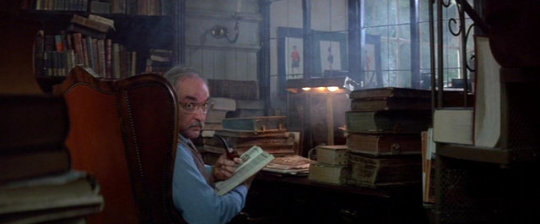
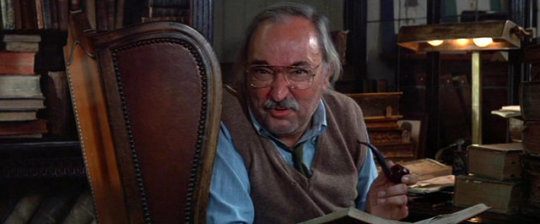
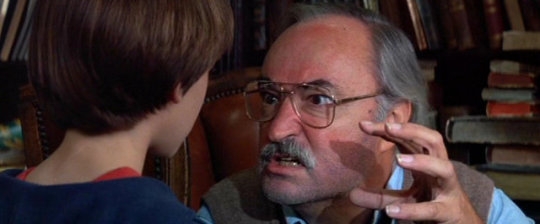
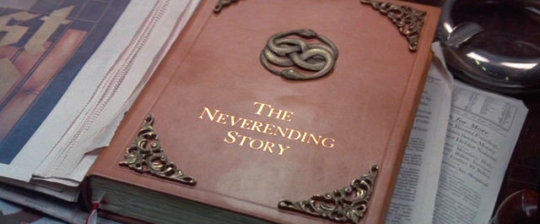
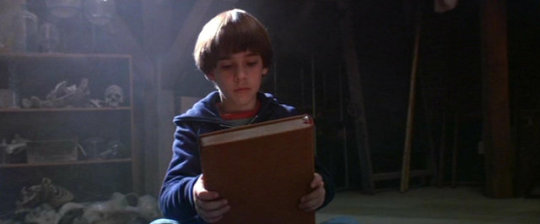
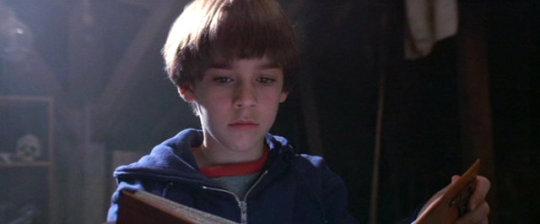
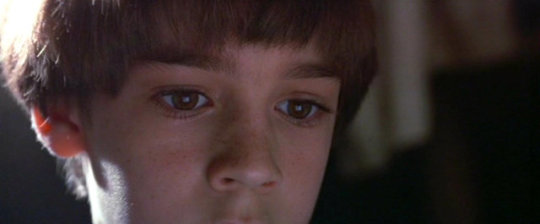
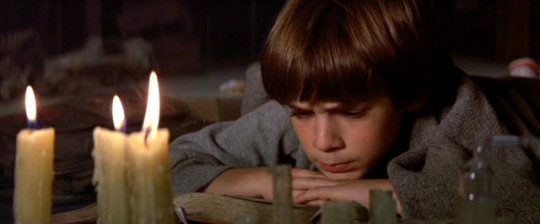
The NeverEnding Story
#The NeverEnding Story#Barret Oliver#Thomas Hill#Carl Conrad Coreander#Michael Ende#Herman Weigel#Robert Easton#Wolfgang Petersen
69 notes
·
View notes
Text
10 Interesting German Novels
1. Die Blechtrommel (The Tin Drum) by Gunter Grass
Born in 1924, Matzerath decided at the age of three to stop growing, retaining the stature of a child whilst having an adult’s capacity for thought. Nobel Prize-winning author Günter Grass’ most famous novel is not the easiest of reads, but it is definitely worth the effort. The book “most completely defines the [20th century] in all its glories and catastrophes – the moods, atmospheres, manias, streams, currents, histories and under-histories.” (Britannic.com)
2. Buddenbrooks by Thomas Mann
Buddenbrooks is a 1901 novel by Thomas Mann, chronicling the decline of a wealthy north German merchant family over the course of four generations, incidentally portraying the manner of life and mores of the Hanseatic bourgeoisie in the years from 1835 to 1877. (Wikipedia.com)
3. The Neverending Story by Michael Ende
The book centers on a boy, Bastian Balthazar Bux, an overweight and strange child who is neglected by his father after the death of Bastian's mother. While escaping from some bullies, Bastian bursts into the antiquarian book store of Carl Conrad Coreander, where he finds his interest held by a book called The Neverending Story. Unable to resist, he steals the book and hides in his school's attic, where he begins to read. (Wikipedia.com)
4. All Quiet on the Western Front by Erich Maria Remarque
All Quiet on the Western Front is a novel by Erich Maria Remarque, a German veteran of World War I. The book describes the German soldiers' extreme physical and mental stress during the war, and the detachment from civilian life felt by many of these soldiers upon returning home from the front. (Wikipedia.com)
5. Perfume: The Story of a murderer by Patrick Suskind
In the slums of eighteenth-century France, the infant Jean-Baptiste Grenouille is born with one sublime gift—an absolute sense of smell. As a boy, he lives to decipher the odors of Paris, and apprentices himself to a prominent perfumer who teaches him the ancient art of mixing precious oils and herbs. But Grenouille’s genius is such that he is not satisfied to stop there, and he becomes obsessed with other smells like the scent of a beautiful young virgin. (Amazon.com)
6. The Sorrows of Young Werther by Johan Wolfgang van Goethe
Written in diary form, it tells the tale of an unhappy, passionate young man hopelessly in love with Charlotte, the wife of a friend - a man who he alternately admires and detests. (Goodreads.com)
7. Siddhartha by Hermann Hesse
It is the story of the quest of Siddhartha, a wealthy Indian Brahmin who casts off a life of privilege and comfort to seek spiritual fulfillment and wisdom. On his journey, Siddhartha encounters wandering ascetics, Buddhist monks, and successful merchants, as well as a courtesan named Kamala and a simple ferryman who has attained enlightenment. Traveling among these people and experiencing life’s vital passages–love, work, friendship, and fatherhood–Siddhartha discovers that true knowledge is guided from within. (Amazon.com)
8. Demian by Hermann Hesse
Demian presents the reflections of an older man on his childhood. In this book, Emil Sinclair recounts the various episodes of his childhood that led to a profound change in his Weltanschauung or worldview. Interspersed in and among these tales are Sinclair's recollections of what he was thinking at the time in question and some analysis of why he acted as he did in any given situation. (Sparknotes.com)
9. The Royal Game by Stefan Zweig
The narrator opens the story on a passenger liner traveling from New York to Buenos Aires. Driven to mental anguish as the result of total isolation by the Nazis, Dr. B, a securities expert hiding valuable assets of the nobility from the new regime, maintains his sanity only through the theft of a book of past masters' chess games which he plays endlessly, voraciously learning each one until they overwhelm his imagination to such an extent that he becomes consumed by chess. (Wikipedia.com)
10. The Man Without Qualities by Robert Musil
Set in Vienna on the eve of World War I, this great novel of ideas tells the story of Ulrich, ex-soldier and scientist, seducer and skeptic, who finds himself drafted into the grandiose plans for the 70th jubilee of the Emperor Franz Josef. (Goodreads.com)
9 notes
·
View notes
Text
Neverending Story casting. No idea if I'll ever actually do it tho
Lance - Bastian
Keith - Atreyu
Kosmo - Artax
Shiro - Falcor
Allura - Child-like Empress
Pidge - Teeny Weeny
Hunk - Rock Biter
Romelle - Night Hob
Sam - Engywook
Colleen - Urgl
Lotor - G'Mork
Coran - Carl Conrad Coreander
Tavo - Cairon
Listened to this on repeat while I made the cast list
4 notes
·
View notes
Text
The inevitable follow up to my last post, the Good Omens/The Neverending Story fusion:
Warlock as Bastian Balthazar Bux
Adam as Atreyu
Aziraphale as Carl Conrad Coreander (the grumpy bookseller)
Crowley as Falkor the luckdragon (book!Crowley is an optimist. Also dragon, snake, shut up it works)
Madame Tracy and Shadwell as Urgl and Engywook, the old gnome couple
Brian, Wensleydale, and Pepper as Rockbiter, Nighthob, and Teeny Weeny respectively
Gmork (wolf dude) can shift between War, Famine, and Pollution (not Death though; we’ll get to him in a second)
God as the Childlike Empress. This isn’t so much a fusion as it is just an observation of how Fantasia/Fantastica works, honestly
Death as Old Man of Wandering Mountain (read the book, you heathen)(in the book (spoilers), after Atreyu returns to the Childlike Empress believing he failed, Bastian still doesn’t say anything. So the Childlike Empress puts him and Falkor someplace safe to rest (more on that in a minute) and goes to find Old Man of Wandering Mountain. He writes down everything that happens in Fantasica in a book. Aha, says clever you, he’s writing The Neverending Story book Bastian is reading. False. He is writing The Neverending Story book we are reading, complete with the parts about Bastian. The Childlike Empress makes him start rereading what he’s written, trapping them in an eternal loop until Bastian finally says her name.)(This also isn’t so much a fusion as it is just an observation of how Fantastica works)
Remember that safe place I mentioned? So it turns out the AURYN, the Childlike Empress’ pendent, is also a place, the one that exists at the border of Fantastica and the real world (and it has the Water of Life, but that’s besides the point at the moment). Inside are the two snakes on the pendent, a white one and a black one. And, plot twist (that I just made up and has no basis in canon), the snakes are also Aziraphale and Crowley. While they are always in the pendent, they are simultaneously capable of leaving and taking on other forms to nudge things along. Aziraphale can go to the real world and Crowley can go to Fantastica. Did I just make this plot twist up for no other reason than ensuring my OTP can still be together? Yes. Absolutely. Why is that even a question?
#good omens#the neverending story#fanfiction#fic idea#fandom fusion#more stuff i will never write#and this time i mean it#azcrow#ineffable husbands
12 notes
·
View notes
Photo
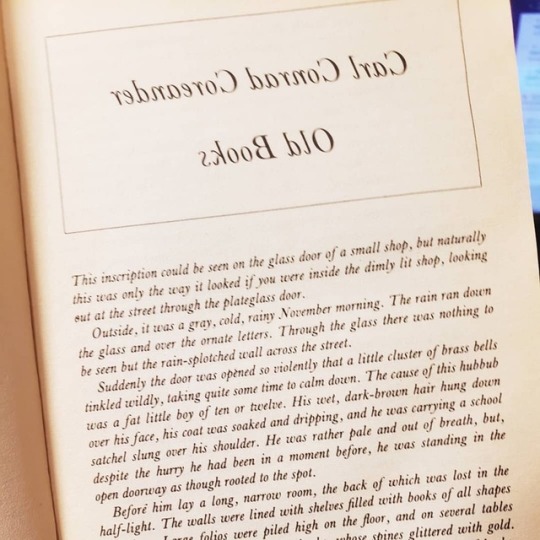
"Carl Conrad Coreander - Old Books" This reminds me of Bouland Brothers Booksellers where I purchased this book. I miss this store every day, it was truly a hidden treasure. I didn't purchase nearly enough books nor did I read enough in my youth, but I plan on making time for both going forward. Onward to adventure! 📖 https://www.instagram.com/p/Br8lgDpnJTn/?utm_source=ig_tumblr_share&igshid=1wmdirr2cnjtc
3 notes
·
View notes
Link
Inspiration for Charon! Notes:
-made sigmund's sword
-has a story where he married a swan maiden
Another source of inspiration is Carl Conrad Coreander from the neverending story, but there's overlap with the book man. A wangerian counterpart may be Mime, from the opera Siegfried, or a character from an unfinished work, https://en.m.wikipedia.org/wiki/Wieland_der_Schmied_(libretto).
4 notes
·
View notes
Text
10 Things About The Neverending Story That Make No Sense
The beloved favorite 80s movie for many a Millennial child, The Neverending Story is filled with magic, adventure, and wonder. It made kids cheer, laugh, cry, and even cower in fear, which is a feat that most children's movies, save from the Toy Story franchise, have been unable to do since. Even though it's such a beloved piece of childhood for so many, that doesn't mean it's without its problems.
RELATED: MBTI® Of Neverending Story Characters
Many issues that the film has are explained away in Michael Ende's book, which was the source material the movie was very loosely based upon. But the film veers so far from his writing that as a standalone, it really often makes no sense.
10 The Nothing Isn't Nothing
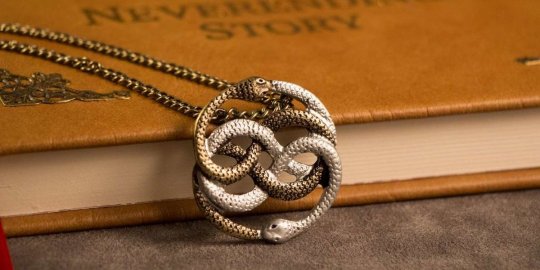
When the Nothing arrives to destroy everything in its path, it certainly isn't nothing. It's a bunch of dark clouds, fierce winds and chaos. It's more like a spring day in a Midwestern town in Tornado Alley than "nothing." When it arrives, Atreyu has to hold onto things before he's swept away into it.
RELATED: 10 Things That Make No Sense About A Star Is Born
The Nothing leaves nothing, or nearly nothing, behind following its destructive path, which makes its name a much more accurate description of what's left behind it as it passes through. A more accurate name for the phenomenon might be Dorothy or F5, given its tornado-like effects.
9 Even The Good Guys Are Creepy

The Neverending Story is filled with creepy creatures, which is one of the many reasons why we love it. Looking back, it's clear that there were far more creepy people and creatures in the movie than we realized, starting with ominous bookstore owner Carl Conrad Coreander who beckons Bastian closer and ending with Engywook and Urgl, who simultaneously feed Atreyu disgusting things before throwing him into the worst danger yet. Even Falkor, the cool luckdragon, is incredibly foreboding.
RELATED: 10 Remakes Of Movies That Were Rumored To Happen (But Still Haven’t)
Perhaps these off-putting characters helped parents teach kids "stranger danger," since creepers don't always look like creepers... Nope, that doesn't work, because in The Neverending Story, everyone looks like a creeper.
8 Bastian's Dad Is Heartless
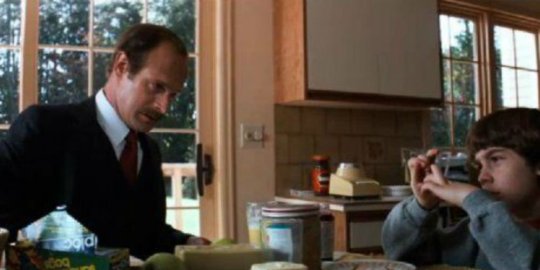
Much of Bastian's troubles in the movie stem from him having to cope with the loss of his mother. He has nightmares, struggles at school and isn't even interested in the riding lessons he had desperately wanted. Instead of helping him process these strong feelings and being there for his son, Bastian's dad tells him that he can't let the loss of his mother keep him "from getting the old job done," as if they'd lost a goldfish instead of his own wife.
Granted, modern dads are much more woke when it comes to parenting, but this is so cruel and callous that we almost expect him to appear as a villain later in Fantasia, a la Jason Isaacs' performance as both Mr. Darling and Hook in Peter Pan.
7 The Entire Thing Is A Swamp Of Sadness
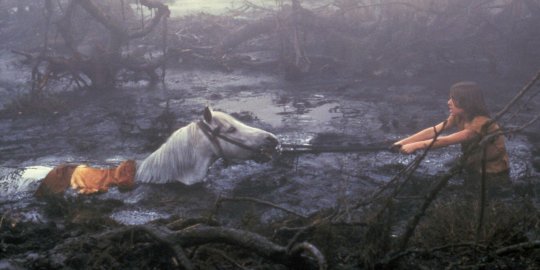
Most kids' movies are filled with laughter, vibrant colors and engaging material. There may be some depressing moments, but they are few and far between. Not so for this one! Most of the movie is dark, depressing and slow as the audience rumbles through one loss after another, witnessing the land's leading brain give up because "nothing matters" and everyone from Artax to most of the characters we've met succumb to the Nothing.
RELATED: 10 Books That Are Still Better Than The Movie
As adults watching The Neverending Story, we have to wonder how we made it through the film without crawling under a blanket fort and hiding for a week afterward. It's that depressing.
6 Bastion Escapes In The School Attic
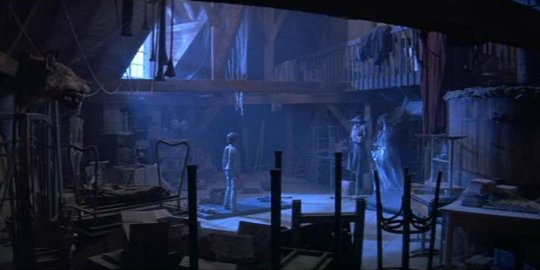
It's already pretty messed up that Bastian skips class just to avoid a math test, but instead of leaving the building and finding a more familiar spot to cut classes at like a normal kid, Bastian grabs the key to the school attic and hides in there. How does he even know to do this? Why would the attic of the place he's actually avoiding even come to mind as a decent hideout?
Then there is the attic itself, which is full of a bunch of weird, creepy stuff to begin with. It's much more like the attic of someone's creepy grandpa who used to hunt wolves than a room that belongs in a school.
5 Characters Give Up And Off Themselves
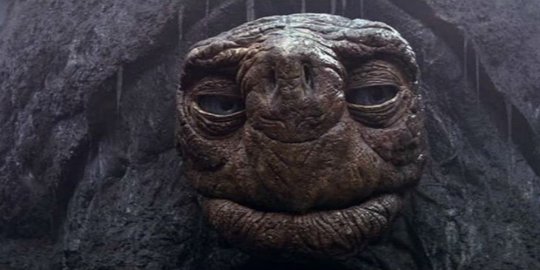
In an existential theme that is way too dark and deep for a kids' movie, the characters we have nostalgia for are so much darker than we recall. Morla's funny sneezing distracted us from the fact that the giant turtle had given up on life and welcomed the end of Fantasia. It didn't even care whether or not it cared.
RELATED: 10 Dungeons & Dragons Campaigns That Would Make Great Movies
Then there's Artax, who simply abandoned his will to live in the Swamps of Sadness. He had no injuries, no illness; just a deep pit of despair that he succumbed to, leaving plenty of analogies to be made about mental illness, depression and one's demise on their own terms. This is completely out of place in a children's fantasy.
4 Atreyu's Confrontation With Gmork Is Over In Seconds
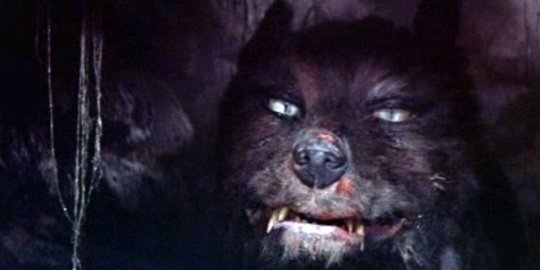
What should have been the climax of the movie is not only anticlimactic, but it's over in seconds, negating all of that beautiful tension it built throughout the film. Gmork is on Atrey's tail so closely that he almost nabs him in the Swamps of Sadness before Falkor sweeps in and saves the day, and there are several moments where it cuts to the servant of the Nothing to demonstrate what a terrible threat he truly is. Those green eyes! That scary maw!
It was all for naught. The final battle had a bit of a monologue/question-and-answer session, followed by a single leap and a knife to the creature's gut. That's it. As kids, this terrified many, but as adults, we can't help but wonder if they just ran out of time.
3 It Breaks Rules We Have Today
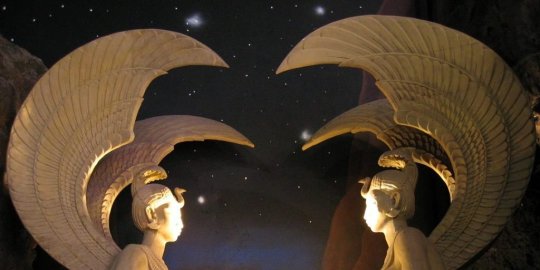
While it makes sense that rules and regulations evolve over time, some of the societal rules that The Neverending Story breaks are weird--and one of them even makes less sense today. The Southern Oracle shows a bit of female anatomy in a children's movie that is edited from everything from movies to Facebook today, and most people find it ridiculous. After all, the same piece of skin on male anatomy isn't edited, and it is only skin.
RELATED: The Dark Crystal: Age of Resistance - 10 Things To Know About The Upcoming Netflix Series
Bastian's father also drinks a raw egg from a glass, which may have once been considered a healthy start to one's morning but is now regarded as practically summoning salmonella into one's body. Kids aren't even encouraged to eat cookie dough with raw eggs anymore.
2 Bastian's Name Makes No Sense
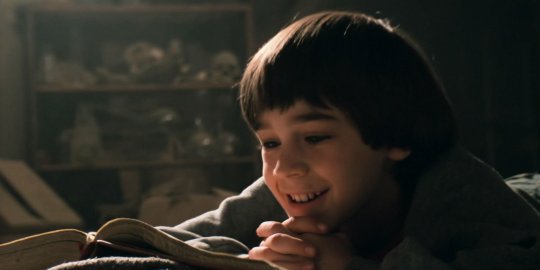
At the Southern Oracle, we learn that the Empress needs a new name, and that it can only be given by an Earthling child. It's a dead giveaway, but Bastian is oblivious and mutters about how he could give her a wonderful name: the name of his mother. It's definitely implied that if he were to name her, he would give the empress his mother's name.
When the time comes, he instead calls out "Moonchild!" in a storm, making it super hard to understand not only because of the way it's said, but why it was chosen. Was his mom really named Moonchild? If not, why rename "the Childlike Empress" a name like "Moonchild," which only makes her seem even less powerful?
1 The Big Finale Isn't Big, Or A Finale
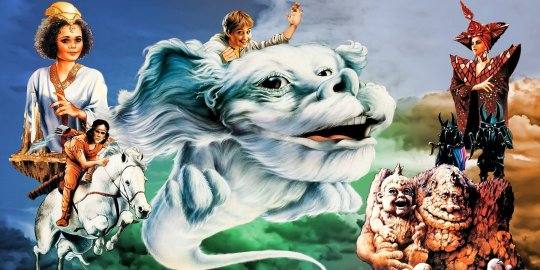
In an epic fantasy, fans want to be wowed by some major discovery by the end of the work. The more magical it is, the better. That's why the big finale, which revealed that the power was in Bastian all along, was a total letdown.
It was cool for kids to see another kid with the power, but realizing that he could've used it all along to save us from the harrowing moments mentioned above is sort of traumatic. Add to that the fact that Bastian called out a name none of us could even understand in what should've been a big moment, or the fact that he'd have many more adventures, "but that's another story," and it doesn't even feel like a conclusion.
NEXT: 10 Pre-Lord Of The Rings High-Fantasy Movies That Are Still Worth Watching
source https://screenrant.com/neverending-story-sense-plot-holes/
0 notes
Text
The Neverending Story, Chapter 26 - The Water of Life
(Curious what I'm doing here? Read this post! For the link index and a primer on The Neverending Story, read this one! Like what you see? Send me a Ko-Fi.)
In which our story comes to an end.
Zigzagging(1) unsteadily, scarcely able to control his feet, the boy who had no name took a few steps toward Atreyu. Then he stopped. Atreyu did nothing, but watched him closely. The wound in his chest was no longer bleeding.
For a time they just watch each other, until the boy takes Auryn off his neck, laying it before Atreyu.(2) The gem becomes blindingly bright, and when the boy can open his eyes again, he and Atreyu and Falkor have been transported. They're in a huge golden building with two great snakes in the middle, a living Auryn, guarding the fountain of the Water of Life.
Falkor can hear the song the Water sings, and translates for Atreyu and the silent boy. Essentially, the Water wants to be drunk, and at first isn't sure about the silent boy, but Atreyu offers to vouch for him, because he remembers everything the boy who was Bastian ever told him, and they were both right and they were both wrong but they were always friends,(3) and the boy gave up Auryn of his own free will.
The Water accepts this proposal, and Falkor says this place is Auryn, and the three are welcome. Auryn is the door Bastian was looking for, he carried it throughout his journey,(4) but nothing of Fantastica can pass through it: he'll have to give up all Moon Child gave him to continue. Atreyu asks, is this not Moon Child's symbol? The Water, through Falkor, replies that this is the one place she can never go, and she's the one person who can never be here, because she can't give up herself and live.
The Water asks if Bastian is ready, and the black snake moves to form an arching gate for them to pass under. Atreyu takes the silent boy's hand, and walks him forward to the fountain. As they walk, all Bastian's Fantastican wish-gifts fall away, and he becomes "the small, fat, timid boy" once more, naked for his human clothes were left behind.
In this last moment, when he no longer possessed any of the Fantastican gifts but had not yet recovered his memory of his own world and himself, he was in a state of utter uncertainty, not knowing which world he belonged to or whether he really existed. But then he jumped into the crystal-clear water. [...] He drank till his thirst was quenched. And joy filled him from head to foot, the joy of living and the joy of being himself. [...] If he had been free to choose, he would have chosen to be no one else. Because now he knew that there were thousands and thousands of forms of joy in the world, but that all were essentially one and the same, namely, the joy of being able to love.
For the rest of his life, his joy never left Bastian entirely, not even in his most difficult moments.
Bastian looks to Atreyu and Falkor and calls for them to join him, but they cannot. Atreyu explains that he remembers being here, once before, when he and Falkor were sleeping.
Bastian comes out of the Water and remarks that he knows who he is again. Atreyu says he's once more the boy Atreyu saw in the Magic Mirror Gate.
Bastian says he'd like to take some of the Water for his father. Atreyu is skeptical, since the Water said nothing of Fantastica can cross the border, but Falkor says Bastian can do it, but the Water says it's time to move on now, for all three of them.
Bastian must go through the white snake's gate, but the snake isn't moving. It demands, through Falkor, that someone finish the stories Bastian started. If not Bastian, then someone in his stead. Atreyu volunteers, and Bastian swears he'll never forget Atreyu or, by extension, Fantastica. Bastian asks how they'll do it, though, and Falkor promises, with luck.
Atreyu and Falkor leave, and Bastian turns to see the white snake has risen to form another gate. Bastian takes some of the Water in his palms, and runs through the gate, crying for his father, crying his own name.
The italics return, and Bastian finds himself in the schoolhouse attic.
How long could it have been since he started on his long journey through the Neverending Story? Weeks? Months? Years? He had once read about a man who had spent just an hour in a magic cave. When he returned home, a hundred years had passed, and of all the people he had known as a child he remembered only one, and he was an old old man.
Bastian is sure of this much: there's some cloudy daylight, but it could be any time of day, and it's as cold as it was when he left.
He untangles himself from the blankets, and looks fruitlessly for the book. Resigning himself to the consequences, he goes downstairs. The clock strikes nine as he's looking, so he knows it's morning, at least… but all the classrooms are empty. The front door is locked, and no one answers at the janitor's office.
The bottom-floor windows are all barred, but he remembers there was some work being done on the facade, and there was scaffolding by a second-floor window. He goes and sneaks out that window. The height makes him dizzy, at first, but he remembers his time as the lord of Perilin, the Night Forest, and masters his fear. His body is weaker, but his heart is not.
Bastian makes it to the ground, and runs home so hard that he gets a stitch in his side, but it never stops him. Near the last, he wonders if his father will still be there, but he is, and he sees Bastian coming, opens the door, comes out to meet him. Bastian throws himself into his father's arms, and his father carries him inside, asking what happened to him.
Inside, Bastian's father spreads butter and honey on bread rolls, and Bastian notices that other than looking tired and disheveled, he looks the same as when Bastian left so long ago, and he says so. His father, amazed,(5) says Bastian only left yesterday morning for school. When he didn't come home, his father phoned the school, but the teachers hadn't seen him, so his father spent all night looking for him, even called in a missing persons with the police.
Bastian, not considering any option but the truth, tells his father the whole story, in detail, over many hours. His father listens, as he never had before, except for one break to call the police and say Bastian was found, and to make lunch.
Night was falling by the time Bastian came to the Water of Life and told his father how he had wanted to bring him some but had spilled it. It was almost dark in the kitchen. His father sat motionless. Bastian stood up and switched on the light. And then he saw something he had never seen before. He saw tears in his father's eyes. And he knew that he had brought him the Water of Life after all.(6)
Bastian's father pulls Bastian into his lap, and they sit there, together, for a while. Then he says everything will be different from now on between them. Bastian can only nod, his heart too full to let him speak.
The next day, his father suggests they both take the day off, he'll write an excuse for Bastian's school, and they do something sensational to celebrate a once in a lifetime, if you're that lucky, kind of day. Bastian realizes he's going to need some time to get used to his normal life again, and agrees. His father suggests all sorts of things they could do, but Bastian says he has something he has to attend to first.
He has to talk to Mr. Coreander about the book.
His father offers to do that, but Bastian takes full responsibility for his actions. His father is surprised, and has a look of respect at Bastian, who he says is not the only one who needs time to adjust to the new order of things. Bastian promises he'll be right back, this shouldn't take too long.
When he comes to the shop, there's a customer inside, so he waits outside until they leave, so he can speak privately with Mr. Coreander, who doesn't yell that Bastian is a thief or anything, just asks what he wants this time. Bastian admits to stealing the book, and that he couldn't find it when he was done. Mr. Coreander says none of his books are missing. Bastian describes the book, and when Mr. Coreander is still skeptical, Bastian admits it was a magic book.
Bastian has to take a good two hours to explain to Mr. Coreander, trying to keep it brief, but the old man keeps asking for details. During that time, somehow, they're not disturbed by a single customer.
When Bastian had finished, Mr Coreander puffed for a long while as though deep in thought. At length he cleared his throat, straightened his little spectacles, looked Bastian over, and said: 'One thing is sure. You didn't steal this book from me, because it belongs neither to me nor to you nor to anyone else.(7) If I'm not mistaken, the book itself comes from Fantastica. Maybe at this very moment - who knows? - someone else is reading it.'
Bastian is surprised that Mr. Coreander believes him, but Coreander says any sensible person would. Coreander's answers make Bastian realize he's read the book, as well. Coreander admits it, he knew the Childlike Empress, but not by the Moon Child name that Bastian gave her, and every real story is a Neverending Story. There are many magic books and portals to Fantastica, and many people read them without realizing they hold magic in their hands.
'And besides, it's not just books. There are other ways of getting to Fantastica and back. You'll find out.' 'Do you think so?' Bastian asked hopefully. 'But then I'd have to meet Moon Child again, and no one can meet her more than once.' Mr Coreander leaned forward and lowered his voice. 'Let an old Fantastica hand tell you something, my boy. This is a secret that no one in Fantastica can know. When you think it over, you'll see why. You can't visit Moon Child a second time, that's true. But if you can give her a new name, you'll see her again. And however often you manage to do that, it will be the first and only time.'(8)
Bastian thanks Coreander, and Coreander asks Bastian to stop in and talk sometimes, for you don't meet many people with whom you can share such an experience. Bastian agrees eagerly, but says he has to get back to his father just now. As he turns to the door, Bastian sees his father outside, waiting, beaming with joy.
Mr Coreander closed the door gently and looked after father and son. 'Bastian Balthazar Bux,' he grumbled. 'If I'm not mistaken, you will show many others the way to Fantastica, and they will bring us the Water of Life.'
Mr Coreander was not mistaken. But that's another story and shall be told another time.
=====
(1) This one's really hard to describe. The snakes of Auryn curl upward into an arch over the fountain, behind the Z, while below a figure (Atreyu? Bastian? I think more likely the latter from the clothing, but since Bastian ends up nude, perhaps not) stands next to Falkor, looking at the fountain. (2) Why do you think the boy who doesn't remember being Bastian gave up the gem? Did some ghost of a memory linger? Or was it all he had to offer, to ask for help? (3) Sometimes true friendship is telling your friend they're being a jerk, and standing up to them when you know they're wrong. (4) Chekhov's magic pendant with its many machine gods to disburse. (5) Another case, I think, of something being slightly lost to either translation or time. Amazement is not how I'd expect a parent to react. There's not a wrong way to react, it's not wrong to be amazed at that line, but these sorts of stories are as much about playing to expectation as they are about defying it, it's all about choosing the right way to do each. (6) What do you think the Water of Life is, or symbolizes, or means? I bet there's a thesis out there about this as well. (7) After all, how can an artifact that can disappear and reappear at will ever manage to be owned? (8) What's in a name? A Childlike Empress by any other name would smell as sweet, to let a poorly quoted Shakespeare line run away from me. The name is everything, the creativity, the willingness to give yourself into the journey.
And that's it for The Neverending Story. I'm glad I came back to it, even if I have a very, VERY different perspective on it than I did so long ago. The deep read really polished a lot of thoughts that otherwise would have fled before I had time to even give them a proper thinking-on. Thank you all for coming on this journey with me, and hopefully I'll see you Monday for The Murderbot Diaries!
1 note
·
View note
Text
Ten Interesting German Novels
The End of Days By Jenny Erpenbeck
“ Winner of the Independent Foreign Fiction Prize and the Hans Fallada Prize, The End of Days, by the acclaimed German writer Jenny Erpenbeck, consists essentially of five “books,” each leading to a different death of the same unnamed female protagonist. How could it all have gone differently?―the narrator asks in the intermezzos. The first chapter begins with the death of a baby in the early twentieth-century Hapsburg Empire. In the next chapter, the same girl grows up in Vienna after World War I, but a pact she makes with a young man leads to a second death. In the next scenario, she survives adolescence and moves to Russia with her husband. Both are dedicated Communists, yet our heroine ends up in a labor camp. But her fate does not end there…. “ (Amazon)
Momo By Michael Ende
“ In the ruins of an amphitheatre just outside an unnamed city lives Momo, a little girl of mysterious origin. She came to the ruin, parentless and wearing a long, used coat. She is illiterate and cannot count, and she doesn't know how old she is. When asked, she replies, "As far as I remember, I've always been around." She is remarkable in the neighbourhood because she has the extraordinary ability to listen—really listen. By simply being with people and listening to them, she can help them find answers to their problems, make up with each other, and think of fun games. The advice given to people "go and see Momo!" has become a household phrase and Momo makes many friends, especially an honest, silent street-cleaner, Beppo, and a poetic, extroverted tour guide, Gigi (Guido in some translations).” (Wikipedia)
The Neverending Story by Michael Ende
“ The book centers on a boy, Bastian Balthazar Bux, a small and strange child who is neglected by his father after the death of Bastian's mother. While escaping from some bullies, Bastian bursts into the antique book store of Carl Conrad Coreander, where he finds his interest held by a book called The Neverending Story. Unable to resist, he steals the book and hides in his school's attic, where he begins to read. “ (Wikipedia)
The Magic Mountain By Thomas Mann
“ In this dizzyingly rich novel of ideas, Mann uses a sanatorium in the Swiss Alps--a community devoted exclusively to sickness--as a microcosm for Europe, which in the years before 1914 was already exhibiting the first symptoms of its own terminal irrationality. The Magic Mountain is a monumental work of erudition and irony, sexual tension and intellectual ferment, a book that pulses with life in the midst of death. “ (Amazon)
Death in Venice by Thomas Mann
“ One of the most famous literary works of the 20th century, the novella "Death in Venice" embodies themes that preoccupied Thomas Mann (1875–1955) in much of his work; the duality of art and life, the presence of death and disintegration in the midst of existence, the connection between love and suffering, and the conflict between the artist and his inner self. Mann's handling of these concerns in this story of a middle-aged German writer, torn by his passion for a Polish youth met on holiday in Venice, resulted in a work of great psychological intensity and tragic power. It is presented here in an excellent new translation with extensive commentary on many facets of the story. “ (Amazon)
Steppenwolf by Hermann Hesse
“ Harry Haller is a sad and lonely figure, a reclusive intellectual for whom life holds no joy. He struggles to reconcile the wild primeval wolf and the rational man within himself without surrendering to the bourgeois values he despises. His life changes dramatically when he meets a woman who is his opposite, the carefree and elusive Hermine. The tale of the Steppenwolf culminates in the surreal Magic Theater-For Madmen Only! Originally published in English in 1929, Steppenwolf's wisdom continues to speak to our souls and marks it as a classic of modern literature. “ (Amazon)
The Tin Drum by Günter Grass
“ On his third birthday Oskar decides to stop growing. Haunted by the deaths of his parents and wielding his tin drum Oskar recounts the events of his extraordinary life; from the long nightmare of the Nazi era to his anarchic adventures in post-war Germany. “ (goodreads)
The City of Dreaming Books by Walter Moers
“In this new Zamonian adventure, Optimus Yarnspinner, a young writer, inherits from his beloved godfather an unpublished short story by an unknown author.The search for the author’s identity takes Yarnspinner to Bookholm―the so-called City of Dreaming Books. On entering its streets, our hero feels as if he has opened the door of a gigantic second-hand bookshop. His nostrils are assailed by clouds of book dust, the stimulating scent of ancient leather, and the tang of printer’s ink. Soon, though, Yarnspinner falls into the clutches of the city's evil genius, Pfistomel Smyke, who treacherously maroons him in the labyrinthine catacombs underneath the city, where reading books can be genuinely dangerous. In The City of Dreaming Books, Walter Moers transports us to a magical world where reading is a remarkable adventure. Only those intrepid souls who are prepared to join Yarnspinner on his perilous journey should read this book. We wish the rest of you a long, safe, unutterably dull and boring life!” (Amazon)
Berlin Alexanderplatz by Alfred Döblin
“ The story concerns a murderer, Franz Biberkopf, fresh from prison. When his criminal mentor murders the prostitute on whom Biberkopf has been relying as an anchor, he realizes that he will be unable to extricate himself from the underworld into which he has sunk. He must deal with misery, lack of opportunities, crime and the imminent ascendency of Nazism. During his struggle to survive against all odds, life rewards him with an unsuspected surprise but his happiness will not last as the story continues. “ (Wikipedia)
Night Train to Lisbon by Pascal Mercier
“ Raimund Gregorius teaches classical languages at a Swiss lycée, and lives a life governed by routine. One day, a chance encounter with a Portuguese woman inspires him to question his life—and leads him to an extraordinary book that will open the possibility of changing it. Inspired by the words of Amadeu de Prado, a doctor whose intelligence and magnetism left a mark on everyone who met him and whose principles led him into a confrontation with Salazar’s dictatorship, Gergorius boards a train to Lisbon. As Gregorius becomes fascinated with unlocking the mystery of who Prado was, an extraordinary tale unfolds. “ (Amazon)
1 note
·
View note
Text
MBTI® Of Neverending Story Characters | ScreenRant
While the beloved 1984 fantasy film The Neverending Story might seem too trippy for an MBTI® analysis, the beautiful fight for imagination and wonder is actually filled with some pretty distinctive Myers–Briggs Type Indicator examples. Some characters present prime examples of heroism and bravery while others are masters of science or compassion, and it's easy to see where they fall among the personality types.
RELATED: 10 Remakes Of Movies That Were Rumored To Happen (But Still Haven’t)
As introspective as some of these beloved characters may be, we doubt they have taken the MBTI® test, so we took it for them to find out which personalities each man, child and Rockbiter might fall have.
10 Bastian Bux: INFP
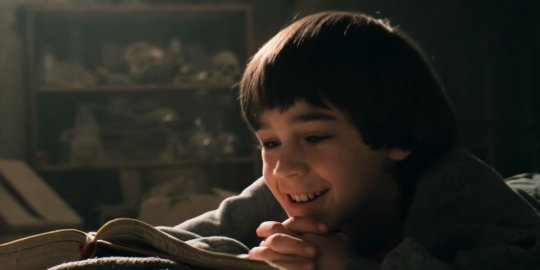
Sensitive young Bastian is every bit the introvert who would rather curl up with a good book than go off on a real, live adventure. He still likes to help people, though, and as an INFP, or the Mediator, he has the imagination to dream up solutions even if he doesn't have the confidence to plan or present them all the time. That's why he had the Childlike Empress's name chosen for her long before he called it out.
Bastian is idealistic and always wants peace, which is why he'd rather avoid conflict rather than address it. Like his father says, he's not a very practical kid, and we witness that at the beginning of the movie when he avoids a math test by hiding in the school attic.
9 Rockbiter: ESFP
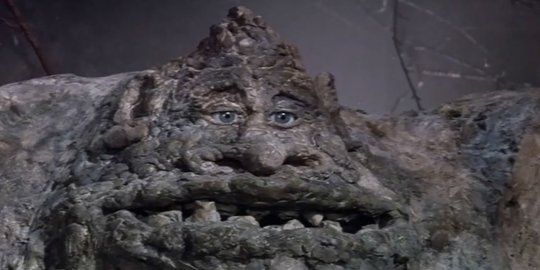
The Neverending Story is filled with introverts, which is probably why it speaks so well to so many of them, but there are a few extroverts. The Rockbiter is a prime example. This kind-hearted, sociable fellow is an ESFP, the Entertainer, who loves to tell stories and be the center of attention. If he met up with his camp friends under better circumstances, he'd surely wow them with his funny tales.
RELATED: 10 Dungeons & Dragons Campaigns That Would Make Great Movies
Rockbiter is sensitive and hurts deeply when he isn't able to save his new friends from The Nothing. He can't stand conflict and longs to get along and make friends with everyone, and he only approaches the Empress for help along with the rest of Fantasia when there's no other option left.
8 Engywook: INTP
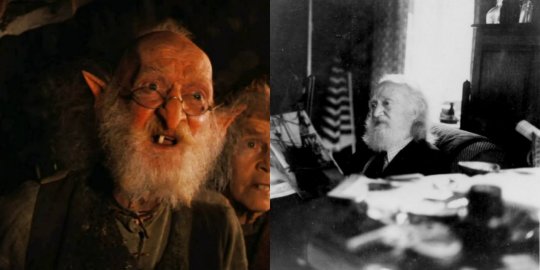
If there's a character of The Neverending Story who completely represents his MBTI® personality to a T, it's Engywook. An INTP, Engywook is the Logician, an inventor who is incredibly pumped about research and science. All he wants to do is study, which is why it's taken him years to learn what Atreyu discovers in moments. Engywook doesn't mince words, and like other INTPs, he can be honest to a fault.
Engywook is rather absent-minded, which is why his wife takes care of him and often picks up the slack. He's also condescending toward her, or anyone who doesn't respect or understand his work at the level he expects. The second-guessing he's done to his own work over the years has likely caused many delays in really understanding the Southern Oracle.
7 Childlike Empress: INTJ
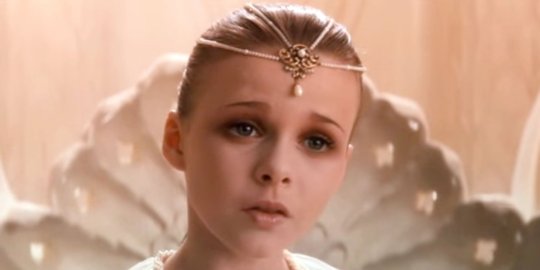
She's the one behind it all, the person who expected Bastian to save her and her world without having ever even told poor Atreyu. The Childlike Empress is the Architect, an INTJ who is confident that her carefully laid plans will all work out.
RELATED: 10 Books That Are Still Better Than The Movie
Viewers might argue that the Empress isn't judgmental or arrogant like an INTJ, but fans of the book know that the film isn't like it at all. There are even rumors that the book's author, Michael Ende, walked off the set because he was so upset with the direction the film was taking. The Childlike Empress is a cold character who is meant to be the main antagonist. In this light, she still fulfills most of the qualities of the Architect.
6 Gmork: ISTP

The servant of The Nothing terrified Millennials as kids and still remains a better CGI wolf than those of Twilight. Gmork, an ISTP, is a Virtuoso with a corrupted heart. Rather than embracing his energetic spirit for good, he serves chaos, and he enjoys putting his body at risk in many dangerous situations--even when it might mean his doom.
Gmork goes down fighting, just as Atreyu says he'd rather do, as his stubborn nature will not allow any reasoning to penetrate his long-held beliefs in his cause. Since Virtuosos get bored easily, boredom may well be one of the causes of Gmork's willingness to serve The Nothing in the first place.
5 Urgl: ESFJ
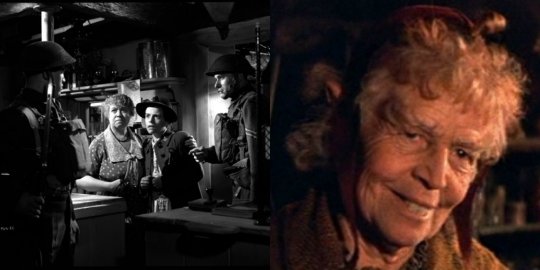
Unlike her husband, Urgl is a more sociable sort who cares about people over science. As an ESFJ, or the Consul, she feels a sense of duty to aid sick or wounded visitors, and uses her husband's scientific tools and space to create potions for healing. She's much warmer than he is, and she's so loyal she's willing to assist him even when he's rather callous toward her.
RELATED: 10 Pre-Lord Of The Rings High-Fantasy Movies That Are Still Worth Watching
Urgl is great at making connections, and like a healer using folk medicine, she likes to use sayings like, "It has to hurt if it's to heal," and "I like that: the patient telling the doctor it's alright!" Urgl is on the stubborn side but she sort of has to be with her husband around.
4 Night Hob: ISTJ

Nobody gives a hoot about him and his stupid bat! The Night Hob is an ISTJ, the Logistician, who is so married to his practical outlook and sense of responsibility that he's actually willing to kick the Rockbiter out rather than share their camp, even though none of the rest of the travelers ate rocks in the first place.
Night Hob has a strong will and wants others to listen to what he's got to say. He believes in the order of things, which is why he's seeking out the empress for help. He's also rather insensitive and judgy, which is why he gives the Rockbiter so much trouble when he visits their camp.
3 Falkor: ENFP

Who didn't want a luck dragon after watching The Neverending Story as a kid? One of the few extroverts among the characters, Falkor is an ENFP, or the Campaigner. Lose your horse in the Swamp of Sadness and ready to give up? He's right there to encourage you to never give up, and "good luck will find you." He's super friendly, and he knows the importance of a good rest, which is why he snuggles up with Atreyu to give the hero a much-needed break.
RELATED: The Dark Crystal: Age of Resistance - 10 Things To Know About The Upcoming Netflix Series
ENFPs are very independent, which explains why Falkor is off on his own much of the time, and they can get emotional and stressed, as viewers saw when he lost track of Atreyu. Still, his enthusiasm is catching, and he's the best bully-buster.
2 Carl Conrad Coreander: INFJ

His shop is where it all begin, with a book that was "special." Carl Conrad Coreander meant to drive Bastian away with his cryptic explanation... or did he? Had he known how the story went, perhaps he pushed Bastian on purpose in order to save Fantasia. This mystical man is the elusive INFJ, or the Advocate, who is wise beyond his years and the only other person who's been to Fantasia. In the animated series, he's even a wizard.
Mr. Coreander points out how different being along for the journey of a story is from actually living in it, giving Bastian the big warning he needed before deciding to venture into the world of Fantasia on his own.
1 Atreyu: ENFJ

Like many heroes, young Atreyu is the Protagonist, or an ENFJ. He's so charismatic that he's able to lead the quest even when he's first judged as a child, and he is so selfless he agrees to venture on the assignment without any weapons to aid him along the journey.
Although Atreyu is a natural born leader, he also has some of the same weaknesses that many ENFJs have, ranging from his inability to make a decision, particularly after the grief of losing Artex and the lack of help from Morla, the Ancient One, to his wildly vacillating self-esteem. One moment, Atreyu is certain of his ability to take on the quest; the next, he is dejected enough to give up, although it's difficult for anyone to remain upbeat in the Swamp of Sadness.
NEXT: 10 Fantasy Books Too Twisted To Be Made Into Films
source https://screenrant.com/mbti-neverending-story-characters/
0 notes